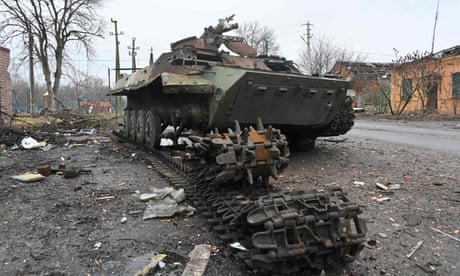- by foxnews
- 04 Apr 2025
Russian soldiers say commanders used ‘barrier troops’ to stop them retreating
Russian soldiers say commanders used ‘barrier troops’ to stop them retreating
- by theguardian
- 28 Mar 2023
- in news

Members of a recently formed Russian assault unit say their commanders deployed troops to stop them from retreating and threatened them with death after they suffered "huge" losses in eastern Ukraine.
In a video addressed to President Vladimir Putin, a group of about two dozen men in military uniform say they are the remnants of Storm, a unit under the defence ministry.
"We sat under open mortar fire and artillery for 14 days," Alexander Gorin, a Russian soldier, is heard saying in the appeal, which first appeared on Friday on Russian Telegram channels. "We took huge losses. Thirty-four people were injured and 22 died, including our commander."
Another soldier said the unit initially comprised 161 men at the start of the operations.
Barrier troops or anti-retreat forces are military units positioned behind frontline forces to maintain discipline and prevent soldiers from fleeing.
"Our commanders are a criminal organisation. There is no other way to put it," said another Russian soldier, who identified himself as Sergei Moldanov.
The Guardian identified eight men in the video. When contacted, three of them confirmed they were members of the Storm unit and verified the account given in the clip.
The men, who asked to remain anonymous, said they had since been evacuated from the frontlines.
The Storm unit was set up by the defence ministry in January to take part in Moscow's grinding winter offensive in eastern Ukraine. At the time of its formation, the ministry said the unit was "specifically designed to break through the most complex and echeloned defence sectors of the armed forces of Ukraine".
According to reports in Russian media, as well as photographs published on the social media accounts of several of the fighters, the unit is made up largely of Russian veterans who took part in Russia's first offensive in Ukraine in 2014.
The Storm soldiers in the video alleged they were being forced to give money to their commanders and those who refused were sent to the frontline.
Their appeal is the latest in a steady stream of similar videos that have surfaced since January, in which Russian soldiers have complained about their poor treatment.
It coincides with Moscow's winter offensive in eastern Ukraine and indicates Russia's troops continue to be plagued by low morale and mismanagement. The clips also serve as a testament to Moscow's willingness to send its soldiers to positions where they face certain death in an effort to break through Ukrainian defences.
Last November, the British defence ministry said Russian forces had probably started deploying barrier troops or "blocking units". "The tactic of shooting deserters likely attests to the low quality, low morale and indiscipline of Russian forces," the ministry said in a statement.
The Kremlin has largely dismissed reports that the Russian army had suffered desertions in Ukraine fuelled by poor conditions and low morale.
The Russian president has also claimed Ukraine was using its own barrier troops, "shooting their own soldiers in the back".
The Russian army, aided by the paramilitary Wagner group, has been throwing tens of thousands of soldiers into battle for more than two months in its attempt to gain ground in the Donbas region. But Moscow's offensive across a 160-mile arc in eastern Ukraine has brought minimal gains at staggering costs. Western officials estimate up to 200,000 have been killed or injured on the Russian side.
In a further sign that Moscow was unhappy with the state of the fighting, Russian media on Sunday reported the defence minister, Sergei Shoigu, had sacked the commander of its eastern military district, Lt Gen Rustam Muradov.
His dismissal represents the latest reshuffle of top brass amid a string of battlefield setbacks. Pro-war bloggers close to the Kremlin linked Muradov's dismissal with his unsuccessful attempts to capture the town of Vuhledar in Donetsk.
Under Muradov's command, Russia is believed to have lost more than 100 tanks and armoured personnel carriers in a three-week battle in Vuhledar last month.
- by foxnews
- descember 09, 2016
'I traveled for an entire year for free - and saved $15K'
Hailey Learmonth explored Australia without paying rent, thanks to pet sitting. She saved $15,000, lived on farms, and embraced remote work to travel on a budget.
read more


